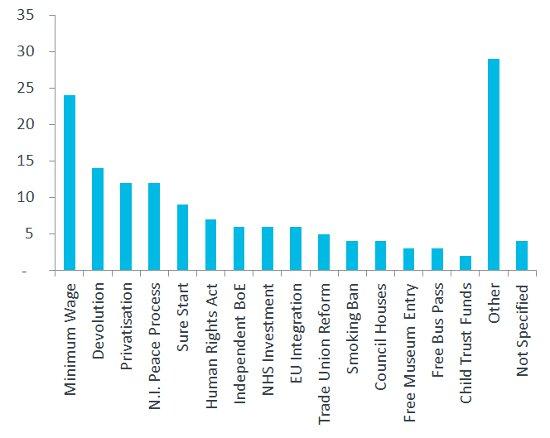Policy making: what worked?
Much of the time we wallow in policy failures - but there are lessons to be learnt from when policies work as well.
As part of our 'Better policy-making' project, we asked members of the Political Studies Association, academics working in the field of politics, what they thought had been the most successful policies of the last 30 years. The results of that survey were released today and are shown in the graph below:
The list is not exactly a surprise. The top three – the minimum wage, privatisation, devolution – are all now embedded and have survived a change of government. What is noticeable is how all of these were moves made relatively early in a new government’s term (though privatisation started small and really built momentum in Mrs Thatcher’s second term). In the case of both the minimum wage and devolution there had been extensive preparation in opposition and in the latter case a lot of learning from the failure of devolution under the Callaghan government. Together with the Political Studies Association, we are running a series of policy reunions to look at what lay behind these successes and what lessons they may have for policy-makers.
The privatisation programme
Last week we assembled many of those involved in the early days of the privatisation programme to discuss how that was developed (PDF, 170KB). What became clear was how ministers and civil servants working closely together and with outsiders from the City and academia (where much of the thinking on regulation had taken place) took the programme forward through an iterative process that found pragmatic solutions to problems no one had tried to solve before. Reconceptualising privatisation from a series of one-off sales with the principal objective of raising money for the Exchequer to part of a much bigger programme with multiple objectives changed the approach – and gave more latitude. Also important was the role of Ministers, No.10 and the Cabinet Office, well before the days of the Delivery Unit, in driving the process forward. The privatisation programme developed its own momentum and pace – but could have been derailed at any time if a sale had failed. Some participants pointed out that it didn’t achieve a lasting change in share ownership – and some of that momentum might have gone too far eg in the demutualisation of the building societies.
The Climate Change Act
In an earlier policy reunion we looked at a more recent example of policy-making – the Climate Change and Sustainable Energy Act under the last government (PDF, 171KB). In that case a combination of external pressure – from the Friends of the Earth “Big Ask” campaign for legislated climate change targets, to David Cameron’s embrace of green issues as part of his repositioning of the then opposition – and David Miliband’s internal leadership as the newly appointed Environment Secretary, put the UK at the forefront of commitment to action on climate change. That drive was underpinned by institutional innovation – the creation of the Office for Climate Change – and the emergence of a network of officials and advisers who worked effectively together to draw up the bill. Next week we are looking at another recent example of successful process – the Pensions Commission chaired by Lord Turner – and in the New Year we will be looking at devolution and the minimum wage as well as the sustained effort over decades to reduce smoking rates.
- Topic
- Policy making
- Keywords
- Policy churn Outsourcing
- Publisher
- Institute for Government
